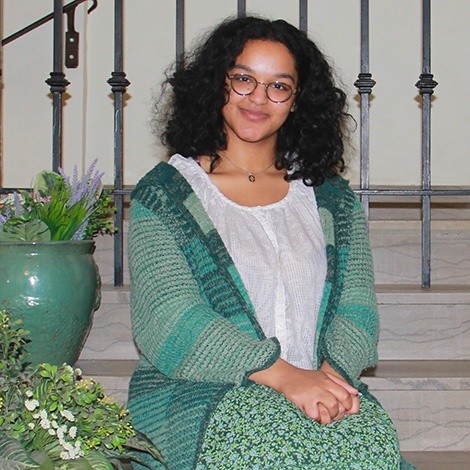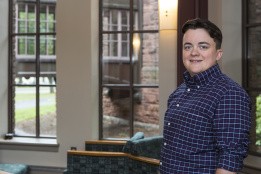There are many ways to begin the study of the mathematical sciences at Mount Holyoke College. Students can begin with precalculus, calculus, an introduction to statistics or data analysis, an "explorations" course, or computer science.
If your interests lie in science, economics, or social sciences, calculus is important because it is the language these disciplines use. Students who are planning to take Precalculus or Calculus I are required to complete a brief online self-assessment. More information is on the department’s website.
If the online self-assessment or your own mathematics background suggests, you should complete a year-long sequence of MATH-100, followed by MATH-101. Mount Holyoke's MATH-100 course (including all of its variants like MATH-100QR) awards 4 credits and fulfills the Math/Science distribution requirement. Precalculus courses taken outside the Mount Holyoke College MATH-100/MATH-101 sequence will not be granted credit nor be approved to satisfy any distribution requirement.
Students who have not studied calculus and who have the necessary precalculus background belong in Calculus I.
Most students who have taken calculus in high school begin with Calculus II. In particular, if you have studied the derivative and its applications and have been introduced to the definite integral, you should take the Calculus Assessment to determine if you are ready to move to Calculus II. More information is on the department’s website.
If you have a good knowledge of applications of integration and of transcendental functions, and if you enjoy mathematics, we encourage you to begin your college-level study of calculus with Calculus III (MATH-203). (The study of series is neither required for nor included in Calculus III. Physics and mathematics students will encounter this topic in later courses.)
Beginning the study of calculus beyond Calculus I does not require the advanced placement examination, although the score on this examination is a useful guide. A student with an advanced placement AB score of 3 or less should begin with MATH-101; an advanced placement AB score of 4 or 5 or a BC score of 3 indicates readiness for MATH-102; a grade of 4 or 5 on the BC examination indicates readiness for MATH-203. More information about placement based on other high school examinations can be found on the department’s website.
Finally, some students begin their study of mathematical sciences with statistics or computer science. For more information see the sections on statistics and computer science in this catalog.
Students interested in this area should plan to cover the material that is included in the first two actuarial exams as part of their undergraduate program. This material is included in:
Students are also encouraged to obtain experience through an internship.
Students interested in these areas should include substantial work in biology, chemistry, geology, and/or environmental studies in their programs.
Students interested in engineering often double major in mathematics and physics and/or participate in one of the College’s five-year, dual-degree programs with Dartmouth’s Thayer School of Engineering, the California Institute of Technology, or the University of Massachusetts (see the Other Degree and Certificate Programs chapter).
Students preparing for graduate school in mathematics or statistics often participate in an undergraduate research program in the summer after the junior year and continue with an honors thesis in the senior year. For students considering graduate work in mathematics, more than the minimum number of courses for the mathematics major is advisable.
MATH-100QR Precalculus: 'Problem Solving and Quantitative Reasoning'
This course is intended for students who, based on the results of their mathematics assessment and the agreement of the instructor, need to strengthen their quantitative and algebraic skills in order to be ready to progress to further mathematics, science, and economics courses. In this class students learn to translate real problems into mathematics, to solve complex multi-step problems, and to gain confidence in using logarithms, exponents, and trigonometry in different contexts.
MATH-101 Calculus I
This course is for students who have not studied calculus and who have the necessary precalculus background. It presents rates of change and their applications, integrals, the fundamental theorem, and modeling of phenomena in the natural and social sciences. All students are required to complete the online self assessment of precalculus skills before the course begins.
MATH-102 Calculus II
Topics include techniques of integration, applications of integration, differential equations, sequences, series, and Taylor series.
MATH-139 Cryptography: The Mathematics of Sending Secret Messages
Cryptography is the study of secret communication between different groups of people. From 4,000 years ago in ancient Egypt when secret hieroglyphs were used to communicate the messages of royalty to today when credit card numbers are encrypted to be transmitted over the internet, cryptography has been a necessary part of human life. In this class we will discuss classical cryptography and some historical ciphers along with the mathematical concepts of the modern field. We will study public key cryptography, prime numbers, the discrete logarithm problem, the Diffie-Hellman key exchange, and RSA encryption. If time permits we will also discuss elliptic curve encryption. In particular, we will use the Python programming language and Jupyter notebooks to implement the encryption schemes that we study.
MATH-203 Calculus III
Topics include differential and integral calculus of functions of several variables.
MATH-206 Introduction to Proofs Through Analysis
An introduction to abstract reasoning in the context of real analysis. Topics will be drawn from the real numbers, mathematical induction, functions, sequences, and continuity. The emphasis is on formal mathematical reasoning and writing through proofs.
MATH-211 Linear Algebra
Topics include elements of the theory of matrices and vector spaces.
MATH-232 Discrete Mathematics
Studies some aspects of discrete mathematics. Topics include sets, functions, elementary probability, induction proofs, and recurrence relations.
MATH-241 Dynamical Systems
Dynamical systems are mathematical models that evolve with time -- for example, the population of a species in an ecosystem or the price of a financial asset. This course will focus on discrete-time models where one iterates a single variable function and follows the evolution of points in its domain. Our aim will be to study the qualitative, long-term behavior of these models by developing mathematical theory and doing simulation. Topics will include periodicity, bifurcations, chaos, fractals, and computation.
MATH-251 Mathematical Experimentation: An Introduction to Research in the Mathematical Sciences
A selection of projects with a goal of discovery of properties and patterns in mathematical structures. The choice of projects varies from year to year and is drawn from algebra, analysis, discrete mathematics, geometry, applied mathematics, and statistics.
MATH-295 Independent Study
MATH-301 Real Analysis
Topics include the real number system, convergence of sequences and series, power series, uniform convergence, compactness and connectedness, continuity, abstract treatment of differential and integral calculus, metric spaces, and point-set topology.
MATH-302 Complex Analysis
Topics include differentiation and integration of functions of a complex variable, the Cauchy integral formula, residues, conformal mapping, and applications to physical science and number theory.
MATH-311 Advanced Linear Algebra
Linear algebra is one of the foundational areas of mathematics. Research from facial recognition and compressed sensing in applied math to deep results in pure math require advanced linear algebra. In addition, computer graphics, large language models, and linear models in statistics rely heavily on linear algebra techniques. Students in this course will learn the abstract mathematical ideas behind these applications, as well as gain experience with computational techniques in the field. Likely topics include abstract vector spaces, inner product spaces, singular value decompositions and other matrix factorizations, numerical techniques, and symmetric matrices.
MATH-312 Abstract Algebra
MATH-312GT Abstract Algebra: 'Groups'
Abstract algebra is the study of the common principles that govern computations with seemingly disparate objects. One way to begin is by studying groups, which are sets with a single operation under which each non-identity element is invertible. Examples include the integers with addition, invertible matrices of size n, permutations of a fixed set, and the symmetries of an object. Our goal is to study a definition of groups that unifies all of the important examples above and more.
MATH-312RT Abstract Algebra: 'Rings'
Abstract algebra is the study of the common principles that govern computations with seemingly disparate objects. One way to begin is by studying rings, which are sets with two operations, typically addition and multiplication. Examples include the integers, the integers modulo n, and polynomials in n variables. Our goal is to study a definition of rings that unifies all of the important examples above and more.
MATH-319 Topics in Algebra
MATH-319GR Topics in Algebra: 'Graph Theory'
Graph theory gives us both an easy way to pictorially represent many major mathematical results and insights into the deep theories behind them. Graphs seem simple -- they're just collections of dots connected by curves -- but are very rich structures that arise naturally in applications ranging from social networks to electric power grids. We will examine properties such as isomorphism, connectivity, planarity, and coloring using classic examples such as paths, cycles, trees, complete graphs, and polyhedral graphs. More advanced topics will be determined by student interest and course trajectory.
MATH-319NT Topics in Algebra: 'Number Theory'
This course will begin with an introduction to number theory, covering material on congruences, prime numbers, arithmetic functions, primitive roots, quadratic residues, and quadratic fields. We will then continue our study of number theory by picking special topics which might include some of the following: Finite Fields, Prime Factorization of Ideals, Fermat's Last Theorem, Elliptic curves, Dirichlet's Theorem on Arithmetic Progressions, the Prime Number Theorem, or the Riemann Zeta function.
MATH-329 Topics in Geometry
MATH-329DG Topics in Geometry and Topology: 'Discrete Geometry'
Discrete geometry is a branch of mathematics that studies geometric objects combinatorially or discretely. There are lots of applications in both pure mathematics and computer science, such as data visualization, computer graphics, robotics, etc. In this course, we will focus on surveying some key themes in discrete geometry, with a strong emphasis on studying concrete examples that can be visualized. Topics may include polygons (triangulations, Pick's Theorem, scissors congruence), convex Polytopes (basic properties, lattice polytopes, lattice point enumeration), Voronoi diagrams. Other topics will be chosen based on students' interests.
MATH-329TP Topics in Geometry and Topology: 'Topology'
This course is an introduction to point-set topology, which is a fundamental language for much of modern mathematics. One of the goals of topology is to understand what it means for a function to be continuous, first in Euclidean space, and then to generalize the notion of continuity to other spaces. The core topics to be studied include: basic set theory, various interesting topologies, continuous functions, connectedness and compactness. Topics from algebraic topology will be covered if time permits.
MATH-333 Differential Equations
This is an introduction to differential equations for students in the mathematical or other sciences. Topics include first-order equations, second-order linear equations, and qualitative study of dynamical systems
MATH-339 Topics in Applied Mathematics
MATH-339FM Topics in Applied Mathematics: 'Rigidity Theory'
A framework constructed from fixed-length bars attached at flexible joints is either rigid or flexible. Such structures arise in many applications in architecture, engineering, robotics, and biology and provide a model for understanding related problems in areas including computer-aided design, sensor networks, and statistics. We will use linear algebra and graphs to develop the theory needed to analyze frameworks and make connections to applications.
MATH-339PD Topics in Applied Mathematics: 'Partial Differential Equations'
Partial differential equations (PDEs) are often used to describe natural phenomena arising in a wide variety of contexts including physics, biology, and economics. Our focus will be on basic yet representative linear partial differential equations such as the heat and wave equations. We will explore the motivation behind each model we study and emphasize methods of finding solutions and analyzing their behavior. Techniques will include transform methods, separation of variables, energy methods, and numerical computations.
MATH-339PT Topics in Applied Mathematics: 'Optimization'
Mathematical optimization involves finding the best solution to a problem from a set of feasible solutions defined by mathematical constraints. It has an elegant theory and applications in fields like management, economics, engineering, and computer science that require decision making under constraints on time or other resources. We will begin by studying linear optimization, including duality, the simplex algorithm, and the geometry of linear programming. Other topics will include discrete optimization, network optimization, and nonlinear optimization.
MATH-339SP Topics in Applied Mathematics: 'Stochastic Processes'
Stochastic processes are mathematical models that evolve with time and include an element of randomness. They involve a collection of states-for example, the weather in a geographical location, the size of a population, or the length of a queue-and a description of how the system evolves from one state to the next. This course is devoted to the study of a class of stochastic processes called Markov chains, and we attempt to study their behavior using tools from probability theory and linear algebra in beautiful, interconnected ways. Topics will include Markov chains in discrete and continuous time, branching processes, queuing theory, and Markov chain Monte Carlo.
MATH-342 Probability
This course develops the ideas of probability simultaneously from experimental and theoretical perspectives. The laboratory provides a range of experiences that enhance and sharpen the theoretical approach and, moreover, allows us to observe regularities in complex phenomena and to conjecture theorems. Topics include: introductory experiments; axiomatic probability; random variables, expectation, and variance; discrete distributions; continuous distributions; stochastic processes; functions of random variables; estimation and hypothesis testing.
MATH-395 Independent Study



